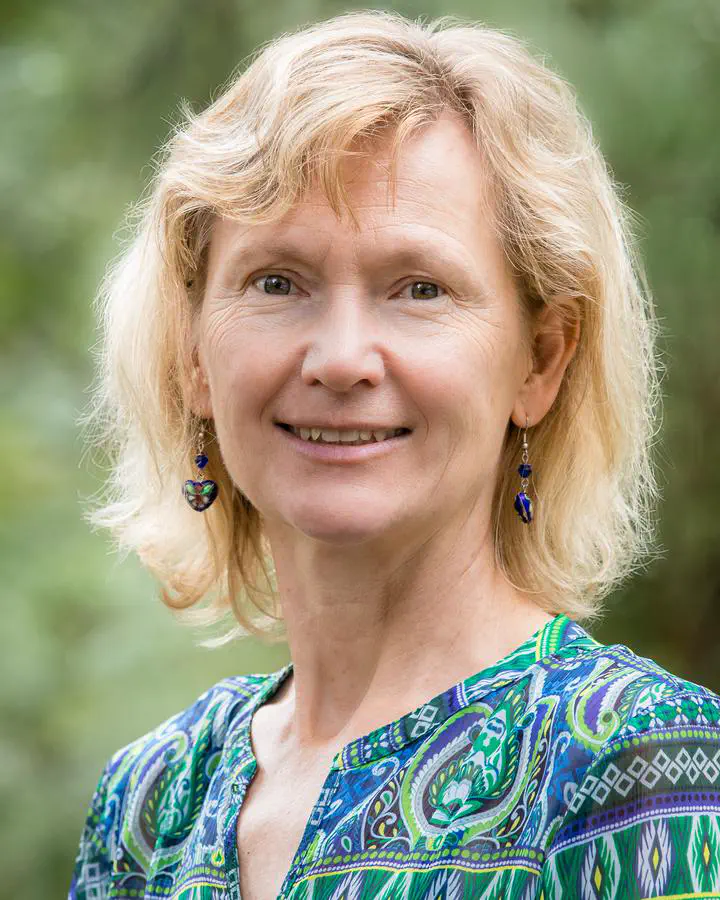Nancy Johnson
 Professor Nancy Johnson
Professor Nancy Johnson
About
Dr. Nancy Collins Johnson is a Regents’ Professor at Northern Arizona University, where she has been a faculty member since 1997. She is an internationally recognized soil ecologist specializing in mycorrhizal symbioses and leads the Johnson Soil Ecology Lab.
Research Interests
Soil Microbial Ecology
- Communities of soil organisms and their interactions
- Microbial ecology of natural and agricultural systems
- Belowground biodiversity and ecosystem function
- Soil microbiome structure and dynamics
Mycorrhizal Symbioses
- Arbuscular mycorrhizal (AM) fungal-plant interactions
- Mutualism-parasitism continuum in symbioses
- Resource exchange and trade balance in mycorrhizal relationships
- Functional equilibrium in plant-fungal partnerships
- Local adaptation and co-evolution in mycorrhizal systems
Stoichiometry of Symbioses
- Carbon, nitrogen, and phosphorus dynamics in mycorrhizal associations
- Resource limitation as driver of symbiotic function
- Nutrient exchange mechanisms between plants and fungi
- Elemental stoichiometry effects on ecosystem processes
Ecosystem Restoration and Carbon Sequestration
- Mycorrhizal contributions to ecosystem restoration
- Belowground carbon storage and sequestration
- Soil stability and structure in restored ecosystems
- Plant community composition effects on soil communities
Education
- Ph.D. Ecology, Plant Pathology, University of Minnesota
- ** M.S.** Botany, University of Wisconsin-Madison
- B.S. Biology, University of Minnesota
Professional Experience
Academic Positions
- Regents’ Professor, Northern Arizona University (2016-present)
- Director, School of Earth and Sustainability, NAU (2017 - 2020)
- Professor, Northern Arizona University (1997-2016)
- Director, Johnson Soil Ecology Lab
International Experience
- Fulbright Research Fellow, Czech University of Life Sciences Prague (2011)
- Fulbright Research Fellow, Lund University, Sweden (2003)
- Visiting Scholar, Multiple international institutions
Research Impact
Dr. Johnson has achieved remarkable research impact with over 19,000 citations of her work across more than 125 publications. Her h-index of 56 reflects the broad influence of her research on soil ecology, mycorrhizal biology, and ecosystem science.
Major Research Contributions
Mycorrhizal Function and Evolution
Mutualism-Parasitism Continuum
- Landmark publication “Functioning of mycorrhizal associations along the mutualism–parasitism continuum” (2,500+ citations)
- Theoretical framework for understanding variation in mycorrhizal functioning
- Context-dependency in the function of plant microbiomes
- Resource availability effects on symbiotic outcomes
Local Adaptation Research
- “Resource limitation is a driver of local adaptation in mycorrhizal symbioses” - Published in PNAS
- Co-evolutionary dynamics between plants and mycorrhizal partners
- Geographic variation in symbiotic effectiveness
- Environmental adaptation mechanisms in fungi
Applications of Soil Ecology
- Seminal 1993 Ecological Applications study - Fertilization leads to selection of inferior mutualist AM fungi
- Agricultural management impacts on mycorrhizal function
- Belowground carbon sequestration across environmental gradients
- Soil structure and stability contributions of biotic and abiotic factors
- Climate change impacts on mycorrhizal symbioses
- Roles of mycorrhizal in ecosystem restoration
- Plant community establishment through fungal partnerships
Book Publications
“Mycorrhizal Mediation of Soil: Fertility, Structure, and Carbon Storage”
- Co-authored comprehensive book on mycorrhizal ecology
- Interdisciplinary synthesis of soil ecology research
Johnson Soil Ecology Lab
Dr. Johnson leads a research group focused on:
Current Research Projects
- Nutritional symbioses among soil organisms
- Trade balance dynamics between plants and mycorrhizal fungi
- Fertilizer reduction potential through mycorrhizal management
- Belowground carbon sequestration mechanisms
Research Sites and Collaborations
- Global research network spanning multiple continents
- Long-Term Ecological Research (LTER) site collaborations
- International partnerships with soil ecology labs worldwide
- Cross-ecosystem studies from agriculture to natural systems
Awards and Recognition
Major Honors
- Fellow, American Association for the Advancement of Science (2020)
- Section on Agriculture, Food, and Renewable Resources
- Fellow, Ecological Society of America (2013)
- Regents’ Professor, Northern Arizona University (2016)
- Ecological Society of America Deborah A. Neher Career Award (2018)
Leadership Recognition
- Co-chair, International Society of Mycorrhizas (2008)
- Bullard Fellowship, Harvard Forest
- Multiple Fulbright Fellowships - International research recognition
Current Research Focus
Dr. Johnson’s ongoing research emphasizes:
- Microbiome comparisons across long-term fertilization experiments
- LTER site collaborative studies on mycorrhizal communities
- Sustainable agriculture applications of soil ecology
Graduate Student Training
Dr. Johnson has mentored numerous graduate students who have become leaders in:
- Soil microbial ecology research
- Mycorrhizal biology and applications
- Ecosystem restoration practice
- Sustainable agriculture consulting
- Academic research careers
Professional Service
Editorial Activities
- Editorial board service for major ecology and soil science journals
- Peer review for Nature, Science, and specialized publications
- Grant review panels for NSF and international funding agencies
Professional Organizations
- Ecological Society of America - Fellow and active contributor
- International Society of Mycorrhizas - Leadership roles
- American Society for the Advancement of Science - Fellow
Teaching Excellence
Student Impact
Students consistently praise Dr. Johnson for:
- Passionate teaching about environmental science
- Care for student success and professional development
- Inspiring approach to complex ecological concepts
- Accessibility and mentorship support
Course Development
- Advanced soil ecology and microbiology
- Mycorrhizal biology and applications
- Ecosystem restoration principles
- Scientific research methods and communication
Global Collaboration
Dr. Johnson maintains active international research partnerships:
- Natural ecosystems mycorrhizal studies
- Agricultural systems worldwide comparative studies
Research Philosophy
Dr. Johnson’s approach emphasizes the fundamental importance of understanding belowground processes for addressing global environmental challenges. Her work demonstrates how basic ecological research on soil microorganisms can provide practical solutions for agriculture, ecosystem restoration, and climate change mitigation.
Future Directions
Dr. Johnson continues to advance:
- Next-generation sequencing applications to mycorrhizal ecology
- Global change experiments with soil microbial communities
- International collaboration expansion in soil ecology research
Legacy and Impact
Dr. Johnson’s distinguished career has fundamentally advanced our understanding of soil microbial ecology and mycorrhizal symbioses. Her research has influenced agricultural practices, ecosystem restoration strategies, and climate change mitigation efforts worldwide while training numerous scientists who continue to expand the field of soil ecology.